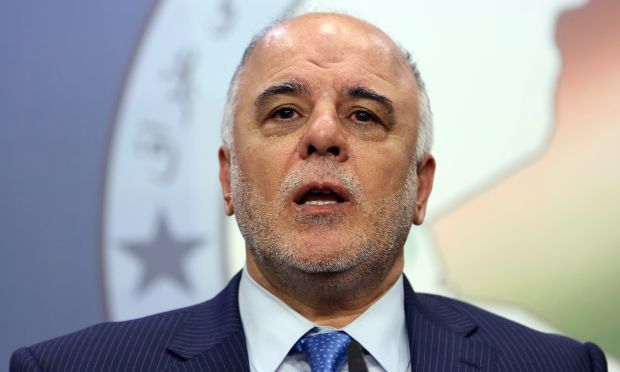
In this July 15, 2014 file photo, Haider Al-Abadi speaks to the media after an Iraqi parliament session in Baghdad. (AP Photo/Hadi Mizban)
Baghdad, Asharq Al-Awsat—Iraqi Prime Minister-designate Haider Al-Abadi, the man tasked with forming the country’s next government and resolving a longstanding political crisis that has very real security implications on Iraq, appears to have come out of nowhere.
Abadi, a member of Maliki’s own Islamic Da’wa Party, was tasked by President Fuad Masoum with forming a new government on Monday. His party leader, outgoing Prime Minister Nuri Al-Maliki, rejected the move as unconstitutional on Wednesday, saying that he continues to seek a controversial third term in office. The embattled incumbent prime minister’s own allies in the Shi’ite-led Iraqi National Alliance—including Islamic Supreme Council of Iraq (ISCI) leader Ammar Al-Hakim and Sadrist leader Moqtada Al-Sadr—had already explicitly announced their rejection of a Maliki third term, as had Iraq’s Kurdish leadership, leaving the political space open for Abadi to step in. He has just 30 days to form a government.
But just who is Haider Al-Abadi?
Abadi was born in Baghdad in 1952. His father was a well-respected doctor. He got involved in politics early, joining the opposition Islamic Da’wa Party while studying for a degree in electrical engineering from Baghdad’s technical college. He graduated in 1975, leaving Iraq for the UK where he completed a PhD at the University of Manchester in 1981. Abadi lived in exile for much of the 1980s and 1990s owing to his affiliation to the Islamic Da’wa Party, which was outlawed under Saddam Hussein’s Ba’athist rule.
Abadi is a longtime ally of Maliki, the man whose position he is now seeking to usurp. He returned to Iraq in 2003, becoming minister of communication in the first post-Saddam government. He was elected as an MP for the Islamic Da’wa Party—itself a member of the Maliki-led State of Law coalition, which in turn is a member of the Iraqi National Alliance—in 2006. Abadi was most recently elected as deputy speaker of parliament, with many political observers believing that he would be a staunch ally of Maliki in parliament. Few could have envisioned the splits that are now erupting within Maliki’s State of Law coalition.
Since Saddam’s ouster, Iraq’s president has always been a Kurd, the prime minister has always been a Shi’ite, and the speaker of parliament has always been a Sunni. However, Iraqi Sunnis have become increasingly disillusioned with the Maliki government, with a number of Sunni-majority provinces—including the western Anbar region—openly revolting against the Baghdad government. The Islamic State of Iraq and Syria (ISIS) terrorist group subsequently entered the scene from neighboring Syria, finding fertile ground for its extremist Islamist ideology among Iraq’s disenfranchised Sunni population. ISIS was able to rout Maliki’s forces, seizing the northern city of Mosul and continuing its advance in central parts of Iraq. Regional and international observers are hoping that Abadi will be able to win back the trust of Iraq’s Sunnis and reorganize the armed forces to confront ISIS.
Abadi’s nomination as prime minister-designate has received broad local, regional and international support, though Iraq’s Sunnis remain wary.
Iraqi parliamentary rapporteur Mohamed Al-Khalidi, a leading Sunni MP, reacted cautiously to the news. “Abadi was one of the strongest defenders of Maliki’s policies. Whether right or wrong, we believe that what has happened is important for the changes that we have been calling for,” he told Asharq Al-Awsat.
“In politics, anything is possible and so we [the Sunnis] are viewing this [appointment] as a first step towards what we have been demanding,” he added.
Khalidi called for caution regarding Abadi’s ties to Maliki and the Islamic Da’wa Party, stressing that a change in the “political approach” of the Baghdad leadership was the most important thing.
“If there is a change in figures, but the political approach stays the same, then it is as if we did nothing,” he told Asharq Al-Awsat.
As for whether Iraq’s Sunnis, many of whom remain in outright rebellion against the Baghdad central government, will cooperate with Abadi, the leading Sunni MP said this would depend on whether Abadi could deliver “what the western provinces have risen up to demand.” He called for the prime minister-designate to return “balance” to the political process in Iraq.
Meanwhile, former State of Law coalition MP Izzat Shahbandar told Asharq Al-Awsat that the fact that a prime minister-designate other than Maliki had been nominated was an important sign.
“The nomination of an alternative to Maliki from within the Iraqi National Alliance—with domestic support and without Iranian instruction—is important,” he said. “This is a change that enjoys domestic and international support and that is very important.”
“Maliki tried to change the political equation by force when he mobilized the security apparatus . . . Even if Abadi is partisan, he is a civilian leader; he comes from a Baghdad family and will be open to civilian life. He is the leader that the present circumstances require,” Shahbandar added.
